March 30, 2018
Edited by David Sanders
Specimen Days
1553—Vitsentzos Kornaros, Greek Renaissance poet (d. 1613 or 1614), is born.
1817—Constantine S Aksakov, Russian historian/poet, is born.
1901—Frans U Kailas, Finnish poet, is born.
1913—R. S. Thomas, Welsh poet (d. 2000), is born.
1933—Jacques Brault, French Canadian poet, is born.
2005—Miltos Sahtouris, Greek poet (b. 1919), dies
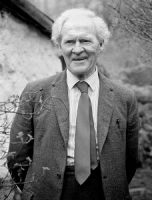
. . . Whose spring
is it sleeps in a glass
bulb, ready to astonish us
with its brilliance? Bring
on the dancing girls
of the future, the swaying
pylons with their metal
hair bickering towards England.
—from “Perspectives” by R. S. Thomas
“Bring / on the dancing girls / of the future” – R. S. Thomas
World Poetry
‘Everything is lost’: A Poet in Conflict-torn Kashmir Laments the Destruction of his Life’s Work
The poet was scribbling verse one Thursday afternoon when gunshots rang out. He dropped his pen and looked around for signs of danger. Minutes later, three armed men pushed their way into Ghulam Mohammad Bhat’s house, ignoring his wife’s protests. The militants told Bhat and his family to leave. “They told me I can take away any precious thing from the house. They wanted to die and attain martyrdom,” he recounted. Bhat and his family ran. The 52-year-old poet abandoned his life’s work — about a 1,000 pages of poetry — in his home, not knowing that within hours it would be reduced to ash.
An Encounter, in Verse, Between a Palestinian-American and an Israeli Jew
Naomi Shihab Nye and Yehuda Amichai walk into a bar
Actually, they ran into each other on the street in Jerusalem years ago. Nye, the award-winning author of dozens of books for children and adults, calls herself a “wandering poet” (she grew up in St. Louis, San Antonio, and Jerusalem) and served as Chancellor of the Academy of American Poets from 2010 to 2015. Amichai, of course, was one of the greatest Israeli poets of all time.
Withdraw My Works from Textbooks, Says Eminent Malayalam Poet Balachandran Chullikkad
Protesting the state of education in Kerala, the poet made this announcement on Monday.
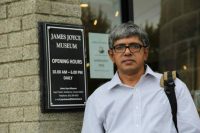
Eminent Malayalam poet, Balachandran Chullikkad, courted controversy when he declared on Monday that he didn’t want his poems taught in schools and colleges. "Don’t teach my poems in schools or colleges. My poems should be excluded from all curriculum. Don't allow research on my poems and also don’t misuse my poems for academic purposes." he said in a press conference in Kochi.
Malayalam poet Balachandran Chullikkad courted controversy when he declared that he doesn’t want his poems taught in schools.
Recent Reviews
Fine Specimens
by David S. Reynolds
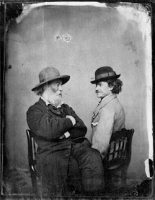
Americans in the second half of the nineteenth century had no sure prospect of resting in peace after death. If their bodies weren’t embalmed for public viewing or dug up for medical dissection, their bones were liable to be displayed in a museum. In some cases, their skin was used as book covers by bibliophiles and surgeons with a taste for human-hide binding. The preservation, exhumation, and exhibition of human remains become, in the hands of the literary critic Lindsay Tuggle, an illuminating basis for a provocative reassessment of America’s foremost poet, Walt Whitman.
In ‘Godsong,’ a New Poem That’s 2,000 Years Old
by Parul Sehgal
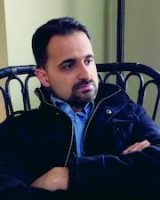
Imagine, if you can, a book beloved by Simone Weil and Steve Bannon. An apologia for war embraced as a classic of pacifism. A holy book admired by scientists. Thoreau took it with him to Walden Pond. Himmler carried a copy in his pocket. Whitman supposedly kept his under his pillow as he lay dying. Gandhi declared it to be his guide — as did his assassin, Nathuram Godse, who carried it with him to the gallows. The Bhagavad Gita, composed between 400 B.C. and A.D. 200 and newly translated by the poet Amit Majmudar in “Godsong,” is the most enigmatic of religious texts, a masterpiece of moral ambiguity.
The Local Hubbub of History – and the Eerie Silence of the Past
by Caitriona O'Reilly

The opening poem in Tom French’s fifth collection, The Last Straw (Gallery Press, €12.50/€18.50) sets the tone for the volume, finding him in an evening frame of mind: “Above us, a flight banks in the dark, / beginning its descent. The road, this night,/ goes quiet. I extinguish the last light.”
Imagine, if you can, a book beloved by Simone Weil and Steve Bannon.
Broadsides
To the Future Readers of Lucie Brock-Broido
by Stephanie Burt
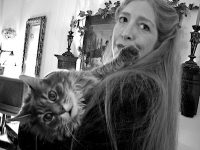
In the far future, when the only readers who cherish and puzzle over Lucie Brock-Broido’s poems are those who never met her, those readers will surely try to imagine what she must have been like in person. Perhaps they will know that she was a charismatic teacher, that she made such an impression in the lives of her students that everybody who knew her (at Harvard, in Cambridge, at Columbia University School of Arts) said there was no one like her. And those readers of the future will try to compile her personal manner from her verse style: gorgeous, elaborate, allusive, sometimes Gothic or haunted, at other times able to revel in beauty, all of it driven by her “propensity for lavish / Order in certain seasons of the year.” She must have been (these readers will assume) an authority figure in an unusual way, a way that drew into itself so many styles—lacy, bejeweled, able to hide at whim, aware of mascara, given to ornament, catlike. She chose rhetoric, chose devices that much of the literary past (the parts of the past run by dudes) believed could not hold power.
When the only readers of Lucie Brock-Broido’s poems are those who never met her, those readers will imagine what she was like.
Drafts & Fragments
Is Sylvia Plath's Driver's License Worth More than a Letter from Dickens?
Even Wordsworth and Napoleon couldn’t compete with Plathinalia going under the hammer this week – including clothes, a typewriter and her thesaurus
by John Dugdale
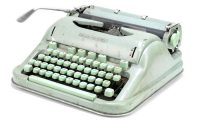
Dickens, Scott, Swift, Wordsworth, Darwin, Adam Smith, even Napoleon; all were just warm-up acts for Sylvia Plath and Ted Hughes, at the top of the bill in a books and manuscripts auction held at Bonhams in London on Wednesday.
Dickens, Scott, Swift, Wordsworth, Darwin, Adam Smith, even Napoleon; all were just warm-up acts for Sylvia Plath and Ted Hughes.
Poetry In the News
US Poet Laureate Tracy K. Smith to Serve Second Term
U.S. poet laureate Tracy K. Smith will serve a second term. Librarian of Congress Carla Hayden announced Thursday that Smith has been reappointed for 2018-2019. The library said that Smith would continue her focus on bringing poetry to rural communities.
A 'Shy' Kansas City Poet, Essayist, And Teacher Wins A Major Literary Prize

Kansas City poet and essayist Anne Boyer, who teaches writing at the Kansas City Art Institute, is among this year's winners of the Whiting Award, a prestigious honor that comes with $50,000. The awards, presented to emerging writers, "are based on the criteria of early-career achievement and the promise of superior literary work to come," according to the Whiting Foundation. Boyer is one of ten winners announced Wednesday evening at a ceremony in New York City.
Kansas City poet Anne Boyer, who teaches writing at the Kansas City Art Institute, is among this year’s winners of the Whiting Award.
New Books
The Explosive Expert's Wife by Shara Lessley
[Paperback] University of Wisconsin Press, 96 pp., $14.95

In sparse, powerful lines, Shara Lessley recalls an expat's displacement, examines her experience as a mother, and offers intimate witness to the unfolding of the Arab Spring. Veering from the strip malls and situation rooms of Washington to the markets and mines of Amman, Lessley confronts the pressures and pleasures of other cultures, exploring our common humanity with all its aggressions, loves, biases, and contradictions.
Search and Rescue: Poems by Michael Chitwood
[Paperback] LSU Press, 82 pp., $18.95
In Search and Rescue, Michael Chitwood seeks what the pagan Celts called the thin places, the spots where otherworldliness bleeds into the everyday. Beginning with childhood, the poet meditates on the intersection of the sacred and secular, on those luminous moments we can only partially understand. Water anchors the collection with the title poem, which explores the history of a large manmade lake and how it changes the surrounding mountain community. Displaying keen narrative skills and an engaging voice, the poems in Search and Rescue pay homage to Whitman and Dickinson, to Heaney and Wright, in pursuit of the everyday grace of Appalachian culture and the natural landscape.
Transmission Loss by Chelsea Jennings
[Paperback] University of Massachusetts Press, 80 pp., $16.95

In the study of sound waves and optics, the term transmission loss refers to how a signal grows weaker as it travels across distance and between objects. In this book, Chelsea Jennings reimagines the term in poems that register attenuated signals, mark presence and loss, and treat the body as an instrument sensitive to the weather of immediate experience. Threading together landscapes, abstract paintings, family heirlooms, maps, manuscripts, and photographs, these poems follow the seasons and traverse the spectrum of visible light. Vivid and precise, Transmission Loss brings us to the boundary between inside and outside, "As if what the hand knows / could be held in the hand."
Inquisition by Kazim Ali
[Paperback] Wesleyan, 104 pp., $15.27
During the 1982 air strikes on Beirut, Faiz Ahmed Faiz asked his friend Mahmoud Darwish “Why aren’t the poets writing this war on the walls of the city?” Darwish responded, “Can’t you see the walls falling down?” Queer, Muslim, American, Kazim Ali has always navigated complex intersections and interstices on order to make a life. In this scintillating mixture of lyrics, narrative, fragments, prose poem, and spoken word, he answers longstanding questions about the role of the poet or artist in times of political or social upheaval, although he answers under duress. An inquisition is dangerous, after all, especially to Muslims whose poetry and art and spiritual life has always depended not on the Western ideal of a known God or definitive text but on the concepts of abstraction, geometry, vertigo. “Someone always asks ‘where are you from,’” Ali writes, “and I want to say ‘a body is a body of matter flung/from the far corners of the universe and I am a patriot/of breath of sin of the endless clamor/out the window.’” Ali engages history, politics, and the dangerous regions of the uncharted heart in this visceral new collection.
Narcissus Americana: Poems by Travis Mossotti
[Paperback] University of Arkansas Press, 94 pp., $17.95
Narcissus Americana sings and scraps and wrestles its way across various landscapes—abandoned quarries, art museums, lavish homes, and tar pits—in a quest to attain a more complex vision of what it means to be upwardly mobile. These poems question the usefulness of wealth and ownership as markers of success. Taking wine fridges and fake flowers as emblems of capitalism’s failure to assuage human loneliness, the speakers in these poems find joy in shared meals and glasses of wine, and use moments of mutual attention to challenge notions of class in America.
The Trailhead by Kerri Webster
[Hardcover] Wesleyan, 90 pp., $24.95

“I'm learning to allow for visions,” the primary speaker of The Trailheadannounces, setting out through a landscape populated by swan-killers, war torturers, and kings. Much of the book takes place in the contemporary American West, and these poems reckon with the violence inherent in that place. A “conversion narrative” of sorts, the book examines the self as a “burned-over district,” individual and cultural pain as a crucible in which the book’s sibyls and spinsters are remade, transfigured. "Sacralization/is when things become holy, also/when vertebrae fuse," the book tells us, pulling at the tensions between secular and sacred embodiment, exposing the essential difficulty of being a speaking woman. The collection arrives at a taut, gendered calling—a firm faith in the power and worth of the female voice—and a broader faith in poetry not as a vehicle of atonement or expiation, but as bulwark against our frailties and failings.
“I’m learning to allow for visions,” the speaker of The Trailhead announces, amidst a landscape of swan-killers, war torturers, and kings.
Correspondences
An Interview with Anders Carlson-Wee
by Christopher Locke

A friend of a friend told me I needed to read this poet named Anders Carlson-Wee, a young man living off the grid and hopping trains. “He just won an NEA in Poetry,” my buddy said. Okay, I thought, that has my attention. But then I read his poem “Dynamite,” from his award winning chapbook of the same name, and was absolutely knocked for a loop. Carlson-Wee crafts images that are raw, precise, and immediate, his language both spare and visceral. In his poems, he effortlessly pairs violence and pain with plain-spoken beauty in such a way as to make the reading experience almost transformative; you can only be fully alive when reading his work. But most importantly, he proves a trustworthy narrator and these poems bear scars, literal at times, that feel lived in and fully earned—nothing phony about Carlson-Wee.
Maureen N. McLane in Conversation
by Rachael Allen
Maureen N. McLane is the author of five poetry collections and of My Poets, a hybrid work of memoir and criticism. Her new book, Some Say, was published by Farrar, Straus and Giroux in July 2017. McLane talked to our poetry editor, Rachael Allen, about ecology, lyric authority, and balancing poetry with criticism.
Poet Laureate Tracy K. Smith on America’s Troubled Racial History
by Kaitlyn Greenidge

The title poem of Tracy K. Smith’s new collection, Wade in the Water, takes place in Geechee country, Georgia, in a ring shout—a religious ritual in which black Christians dance and shuffle in a circle, forming a rhythm and working into an ecstatic state of grace. It’s a common form of worship among the Geechee, a community along the Georgia coast descended from slaves, who maintain their own African-influenced culture and dialect. Smith writes, “One of the women greeted me./I love you, she said. She didn’t/Know me, but I believed her,/And a terrible new ache/Rolled over in my chest,/Like in a room where the drapes/Have been swept back.”
Ferlinghetti Speaks Out at 99, His Voice as Vital as Ever
by John McMurtrie
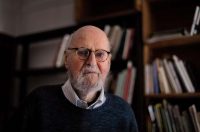
Lawrence Ferlinghetti co-founded City Lights 65 years ago, in 1953. “I’m there in spirit all the time,” he says of the beloved, world-famous bookstore on Columbus Avenue in North Beach. How about in reality? How often is he at the shop? “As a poet,” he says with a laugh, “I don’t deal in reality.”
The title poem of Tracy K. Smith’s new collection, Wade in the Water, takes place in Geechee country, Georgia.
Envoi: Editor’s Notes
Lessons from the Past: R. S. Thomas
"Every poet of any quality loves words. They are what he works with, just as a painter works with paint and texture, a musician works with notes – so a poet works with words. It's a kind of ongoing struggle as to who is to be master. You begin by being, more or less, dominated by the words. You gradually attain a certain mastery, and then you realise it's a bit like touch-typing – you reach a state when you can half be mastered and half dominate. Out of that subtle association, the better works of poetry are born. To have reached a stage of development where you can give yourself to the language and let it carry you along. And yet, all the while, you've also got a hand on the reins to see that it doesn't run completely away with you."
—from "The last of the romantic poets" an interview with Michael March in 1996 published in the Guardian, October 30, 2000
“Every poet of any quality loves words.” – R. S. Thomas